Intermarkets' Privacy Policy
Donate to Ace of Spades HQ!
aceofspadeshq at gee mail.com
Buck:
buck.throckmorton at protonmail.com
CBD:
cbd at cutjibnewsletter.com
joe mannix:
mannix2024 at proton.me
MisHum:
petmorons at gee mail.com
J.J. Sefton:
sefton at cutjibnewsletter.com
Quick Hits
As the Communist Cuban Junta Enters End-of-Life Care, Marco Rubio Begins Secretly Talking to Raul Castro's Grandson About a Living Will
Surprise! Harvard Refuses to Obey the Supreme Court Ruling Outlawing Race Discrimination in Admissions. All They've Done Is End Discrimination Against Asians -- and Doubling Up on Anti-White Discrimination
It Begins: Canada Now Murdering People For Minor Ailments, Just As Predicted
Democrat Snake Ted Lieu: The Epstein Files, Which Are Filled with Disproven False Tips About Everyone, Show That Trump was Raping Children
Democrats Demand Censure for Congressman Randy Fine Due to His Protection of Dogs From Arrogant Foreign Colonizers
Leftwing Media 2-in-1 Post: CNN's Low-IQ DEI Propagandist Abby Philip Defends AOC's Performance By Saying "Buh Trump;"
Steven Colbert Caught in Lie About CBS Censoring Him
Wednesday Morning Rant
Mid-Morning Art Thread
Jim Sunk New Dawn 2025
Jewells45 2025
Bandersnatch 2024
GnuBreed 2024
Captain Hate 2023
moon_over_vermont 2023
westminsterdogshow 2023
Ann Wilson(Empire1) 2022
Dave In Texas 2022
Jesse in D.C. 2022
OregonMuse 2022
redc1c4 2021
Tami 2021
Chavez the Hugo 2020
Ibguy 2020
Rickl 2019
Joffen 2014
maildrop62 at proton dot me
Saturday Evening Movie Thread 09-22-2018 [Hosted By: TheJamesMadison]
Number 9
Over the past few months, I've spent about one post a month talking about one of my top ten films in chronological order. We've had those that have met with much approbation (Casablanca) and some that have not (The Last Temptation of Christ). Tonight we get to what I've long predicted to be the least well-received film: The Thin Red Line.
Terrence Malick
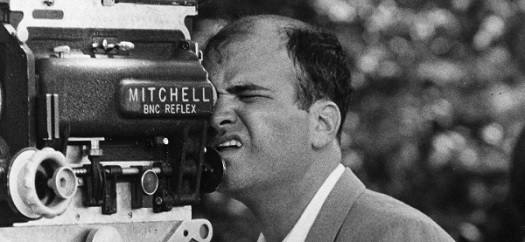
Storytelling is a form of communication, and like any form of communication it has languages. Telling a story around a campfire uses its own vocabulary of sights and sounds to convey emotion. Books have their own. Movies have yet another.
Yet, storytelling is such a large thing, that even different mediums can have their own dialects. An action movie isn't told the same way as a small family drama. Action movies have different ways to edit, convey sound and emotion than most other film types. There's a lot of similarity between these different ways of telling stories, so it can be easy to jump from one to another as a viewer.
And then you get to someone like Terrence Malick. Go back to his first film, Badlands, and you see a new filmmaker working within the box of basic filmmaking narrative, but with his own twist of dream-like qualities throughout. Days of Heaven took it another step, but still pretty firmly as a recognizable story. He then disappeared for twenty years and came back with The Thin Red Line. His third film is significantly larger than his first two, deals with significantly more characters, and a much larger theme. But, he's also largely abandoned the language of most movies.
The films are almost purely emotional journeys that appeal through sight and sound directly. I think they are a form of "pure cinema" (there's even a reference to Bunuel's Un Chien Andalou, a silent film that is often held up as an example of the idea). They are a series of sights and sounds designed to elicit emotional responses. Many do say that Malick fails at this because he never creates a connection between any character and the audience (at least since Days of Heaven), but I disagree. I find his films completely involving.
He's made eight films. I consider two of them to be really good (Days of Heaven and Knight of Cups), three to be great (Badlands, To the Wonder, and Song to Song), and three to be stone-cold masterpieces (The Thin Red Line, The New World, and The Tree of Life). As with the Scorsese and Kubrick films on my list (The Last Temptation of Christ and 2001: A Space Odyssey), I'd be willing to switch out my current pick for the other masterpieces (like Silence and Barry Lyndon).
But enough of that, let's get to the movie.
The Thin Red Line
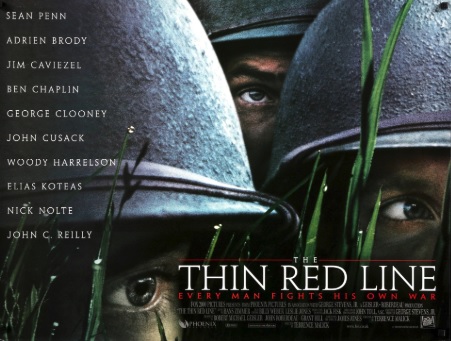
What's this war in the heart of nature? Why does nature vie with itself? The land contend with the sea? Is there an avenging power in nature? Not one power, but two?
-Private Edward P. Train (John Dee Smith)
That's the first line of the movie, and it provides the baseline thesis of the film. Not that war is Hell, but that war is a natural state (reflective of the Nature vs. Grace thesis at the heart of The Tree of Life). I've read reviews of this film that dismiss it as just another film that has nothing to say beyond, "War is Hell," but that obviously misses the entire point of the movie. It starts from "War is a part of nature" and moves on from there. What we end up seeing are portraits of how mankind can break under different types of war.
Out of a cast as large as what's here (including poor Adrien Brody who was hired as the star of the film but effectively cut out of the film), it can be hard to distill individuals as central to the telling of the story, but I do believe that there are three that most effectively show the range of reactions Malick was trying to show. There is a fourth that highlights something else that I will get to in a bit. The three are Lieutenant Colonel Tall (Nick Nolte), Private Witt (Jim Caviezel), and Captain Staros (Elias Koteas). Tall and Witt represent two opposing sides of the human experience, and Staros is somewhere in the middle.
Lieutenant Colonel Tall
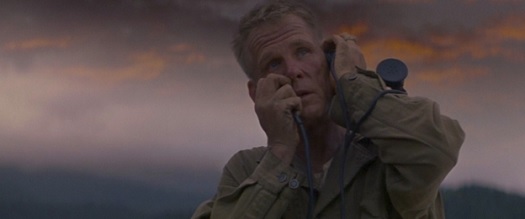
Tall is a career military man who's dedicated to his job. He has a scene early with his commanding officer where the general talks about how colonels become politicians as soon as they gain their eagles. Tall is one rank removed from that, so the implication is that he's still a soldier first. Later, he explodes a bit saying that he's been in the service for so long but never had a war. This is his war, and he's going to prove himself. He studied Homer, in the original Greek, at the Point, and he's waited long enough to prove himself.
He relishes this conflict. He's there to demonstrate his prowess and ability in the face of a determined and entrenched enemy. He understands that in order to win, he'll have to sacrifice human lives under his command, and he's come to terms with that reality. He thrives under these conditions, in this natural state.
Private Witt
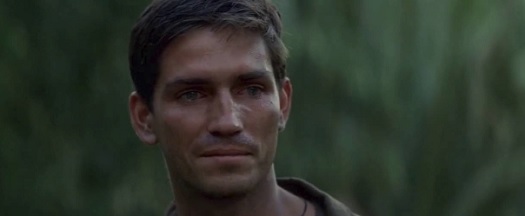
In order to understand Malick in general, you need to understand his most frequent motif: Eden and the search for it once it has been lost. The movie begins with Witt in Eden, an idyllic paradise populated by native aboriginals full of joy and innocence. Witt is then picked up by an American patrol and brought back to the world.
Welsh: In this world, a man himself is nothing. And there ain't no world, but this one.
Witt: You're wrong, there, Top: I've seen another world. Sometimes I think it was just my imagination.
Welsh: Well, then you've seen things I never will.
Witt wants to get back to that which he so briefly experienced, and he spends the entire battle looking for it. He's almost ethereal in how he approaches the conflict. It's as though he considers himself outside of what's going on around him, untouched by death that surrounds him.
The unfortunate reality is that it does. Witt ends up finding himself surrounded by Japanese troops, unable to understand what they are saying to him, and shot dead by a single round.
Captain Staros
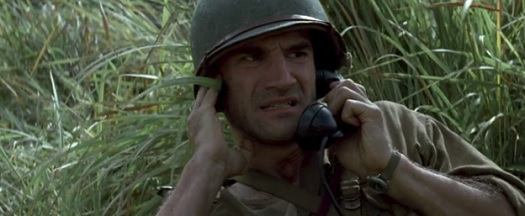
Staros exists between Tall and Witt. He understands the reality of war, but is terrified of having it touch his men. His most important moment is when he refuses a direct order from Tall to initiate a charge against an entrenched position, begging to take his men around on a flanking maneuver instead. He won't sacrifice his men for what he considers a suicide mission.
When Tall comes to inspect the line, it has gone quiet, and Tall allows for Staros to maintain command for the moment.
Are you prepared to sacrifice the lives of any of your men in this campaign? How many? One? Two? Twenty? Lives will be lost in your company, Captain. And if you don't have the stomach for it, now is the time to let me know.
Staros isn't above the fray like Witt or immersed in it like Tall. In the end, Tall sends Staros home to work in the JAG office. Staros just isn't tough fibered enough for this. In the face of war, he doesn't have the stomach for what's required.
Three Together
So, what is Malick trying to explore with these three characters (the three that I find the most prominent in the narrative)? I think it's that we are all bound for war, but not all of us are built for it. It's an exploration of how different types of men face the state that nature is always in. Do we embrace it? Do we act like it's not real? Do we fold under the weight of it? The individual portraits I find to be involving and moving and one of the reasons that I love the movie.
One More Example
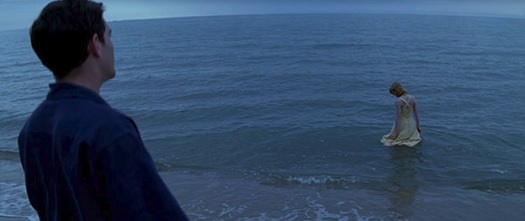
The conflict at the heart of nature as outlined in the opening narration quoted earlier doesn't solely manifest as the conflict between the United States and the Japanese Empire on Guadalcanal. It also shows itself as a conflict between two people. In this instance, it's between man and wife.
Private Bell (played by Ben Chaplin) is akin to Private Witt in that he seems somewhat disengaged from the conflict itself. And, much like Witt, he has his own Eden over which he pines. That Eden for Bell is the time he spent with his wife (played by Miranda Otto in flashback) before the war. When we first meet Bell, he's reclining in his bunk on the ship transporting the infantry to the island where he explains a bit of his past.
Fife: How'd you end up a private?
Bell: Cos of my wife. I was in the corps of engineers. We'd never been separated before, not even for a night. I took it for four months and then I quit. Just resigned. They sent me back to the States. They told me I'd never get another commission. They said they'd see to it I got drafted and that I for damn sure'd be in the infantry.
He was willing to sacrifice his career to stay with her, but the military threw him back into the fight. Despite the distance, the two continue to write to each other, and Bell is consumed with the memories of that time with her.
The first time we hear her voice is when he receives a letter from her about two-thirds of the way through the film. In it, she asks for a divorce because she has met and fallen in love with another officer. Bell is crushed by this, and we view another example of how violence is not the provenance of man, but a natural state. Their time apart allowed the wife to drift away from him and cause him great pain by that fact.
Thesis be Damned, Why Do I Like It?
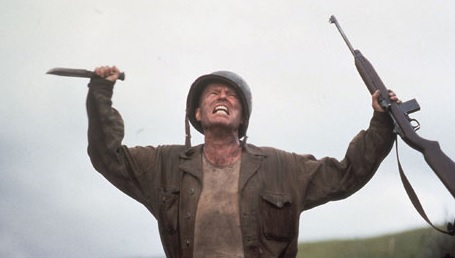
Alright, so I've tried to walk you through the ideas behind the film. And, I can easily imagine someone saying, "That's all well and good, but could Malick keep his camera on a tripod once? Could he have fewer shots of random birds? Could he not have provided some typical narrative structure for me to hang onto?"
And you know what I would say to that? A shrug.
Malick makes films in a very dreamlike manner that seem to float over their subjects more than approach them head on. To me, that doesn't mean that they are disengaged with their subjects, far from it, but that it engages in non-traditional ways. The emphasis of theme and emotion over anything literal (including plot) is just a form of storytelling that many people can't get into.
Does that make them lesser filmgoers? Not at all. I find my love of Terrence Malick's work to be incredibly hard to explain. This is the fourth separate time I've tried to write a post about him, and I've abandoned completely every attempt that has come before. I tend to float from one subject to the next without any real focus.
Some of the reasons that I do love his work is his emphasis of theme, his fluid camera work, his strength with actors (although they tend to end up hating him, just ask Christopher Plummer), and the lyrical cadence of the work in general. I took a few classes with film scholar Stephen Prince in college, and I asked him about Malick. The way he put it was, "Saving Private Ryan is prose. The Thin Red line is poetry."
And that's the thing. Malick is akin to filmmaking poetry. I know that, personally, I don't like regular poetry, but I love to read prose up and down. I can easily see how the language of Malick's narrative poetry doesn't appeal to people in the same way.
But, it does to me. I love how Malick makes films. They are emotional and involving experiences to me.
My recommendation to those uninitiated in Malick but are intrigued would be to start at the beginning. Watch Badlands before anything else. Then go to Days of Heaven, if either of those appeal to you, then dive in, because you will be opening up something wonderful.
If you want to read more, here's the first of a series of essays someone wrote about Malick's films that do a much better job than I ever could (he even spoke to Malick's father at one point).
Movies of Today
Opening in Theaters:
The House with a Clock in Its Walls
Life Itself
Assassination Nation
Next in my Netflix Queue:
Matinee
Movies I Saw This Week:
Hard Rain (Netflix Rating 3/5 | Quality Rating 2/4) Poster blurb: "Really really stupid, but entertainingly so." [Netflix DVD]
The Private Life of Sherlock Holmes (Netflix Rating 4/5 | Quality Rating 3/4) "A solid pair of adventures from the consulting detective. Makes me want to see Wilder’s original long cut." [Amazon Prime]
Slow West (Netflix Rating 4/5 | Quality Rating 3/4) "Well produced, acted, and lensed, but emotionally distant." [Netflix Instant]
The Fifth Element (Netflix Rating 4/5 | Quality Rating 3/4) [Rewatch] "Very fun visually and moves really fast, but it’s emotional denouement falls flat." [Personal Collection]
The Thin Red Line (Netflix Rating 4/5 | Quality Rating 3/4) [Rewatch] "What that guy said." [Personal Collection]
Contact
Email any suggestions or questions to thejamesmadison.aos at symbol gmail dot com.
I've also archived all the old posts here, by request. I'll add new posts a week after they originally post at the HQ.
Please, visit my website.
My first novel, The Battle of Lake Erie: One Young American's Adventure in the War of 1812 is now available for pre-order!
Ben Had: "Chuck roast slow cooked in sofrita sauce for bee ..."
mikeski: "[i]"opening Bluesky makes me actually want to walk ..."
Maj. Healey [/i]: "NO IRISH ..."
fd: "Grandma Guthrie is gone. What a shitty thing to do ..."
Blast Hardcheese: "It always amuses me how the left needs European ap ..."
four seasons: " Eromero, I read earlier today that someone wa ..."
Commissar of plenty and festive little hats : "Gavin is dyslexic AND gay? Tourette's bulimia. ..."
Willie Chili: "The Paolo, he, too, how you say, dispenses bone br ..."
Snake Plissken: "[i]137 Now Mamdani wants to cut 5,000 police offic ..."
Duncanthrax: "Newsom dyslexic? Could be. He walked into a bra ..."
The Horde: " I have made a veggie chili with bone broth and it ..."
Quick Hits
As the Communist Cuban Junta Enters End-of-Life Care, Marco Rubio Begins Secretly Talking to Raul Castro's Grandson About a Living Will
Surprise! Harvard Refuses to Obey the Supreme Court Ruling Outlawing Race Discrimination in Admissions. All They've Done Is End Discrimination Against Asians -- and Doubling Up on Anti-White Discrimination
It Begins: Canada Now Murdering People For Minor Ailments, Just As Predicted
Democrat Snake Ted Lieu: The Epstein Files, Which Are Filled with Disproven False Tips About Everyone, Show That Trump was Raping Children
Democrats Demand Censure for Congressman Randy Fine Due to His Protection of Dogs From Arrogant Foreign Colonizers
Leftwing Media 2-in-1 Post: CNN's Low-IQ DEI Propagandist Abby Philip Defends AOC's Performance By Saying "Buh Trump;"
Steven Colbert Caught in Lie About CBS Censoring Him
Wednesday Morning Rant
Mid-Morning Art Thread
Paul Anka Haiku Contest Announcement
Integrity SAT's: Entrance Exam for Paul Anka's Band
AllahPundit's Paul Anka 45's Collection
AnkaPundit: Paul Anka Takes Over the Site for a Weekend (Continues through to Monday's postings)
George Bush Slices Don Rumsfeld Like an F*ckin' Hammer
Democratic Forays into Erotica
New Shows On Gore's DNC/MTV Network
Nicknames for Potatoes, By People Who Really Hate Potatoes
Star Wars Euphemisms for Self-Abuse
Signs You're at an Iraqi "Wedding Party"
Signs Your Clown Has Gone Bad
Signs That You, Geroge Michael, Should Probably Just Give It Up
Signs of Hip-Hop Influence on John Kerry
NYT Headlines Spinning Bush's Jobs Boom
Things People Are More Likely to Say Than "Did You Hear What Al Franken Said Yesterday?"
Signs that Paul Krugman Has Lost His Frickin' Mind
All-Time Best NBA Players, According to Senator Robert Byrd
Other Bad Things About the Jews, According to the Koran
Signs That David Letterman Just Doesn't Care Anymore
Examples of Bob Kerrey's Insufferable Racial Jackassery
Signs Andy Rooney Is Going Senile
Other Judgments Dick Clarke Made About Condi Rice Based on Her Appearance
Collective Names for Groups of People
John Kerry's Other Vietnam Super-Pets
Cool Things About the XM8 Assault Rifle
Media-Approved Facts About the Democrat Spy
Changes to Make Christianity More "Inclusive"
Secret John Kerry Senatorial Accomplishments
John Edwards Campaign Excuses
John Kerry Pick-Up Lines
Changes Liberal Senator George Michell Will Make at Disney
Torments in Dog-Hell
The Ace of Spades HQ Sex-for-Money Skankathon
A D&D Guide to the Democratic Candidates
Margaret Cho: Just Not Funny
More Margaret Cho Abuse
Margaret Cho: Still Not Funny
Iraqi Prisoner Claims He Was Raped... By Woman
Wonkette Announces "Morning Zoo" Format
John Kerry's "Plan" Causes Surrender of Moqtada al-Sadr's Militia
World Muslim Leaders Apologize for Nick Berg's Beheading
Michael Moore Goes on Lunchtime Manhattan Death-Spree
Milestone: Oliver Willis Posts 400th "Fake News Article" Referencing Britney Spears
Liberal Economists Rue a "New Decade of Greed"
Artificial Insouciance: Maureen Dowd's Word Processor Revolts Against Her Numbing Imbecility
Intelligence Officials Eye Blogs for Tips
They Done Found Us Out, Cletus: Intrepid Internet Detective Figures Out Our Master Plan
Shock: Josh Marshall Almost Mentions Sarin Discovery in Iraq
Leather-Clad Biker Freaks Terrorize Australian Town
When Clinton Was President, Torture Was Cool
What Wonkette Means When She Explains What Tina Brown Means
Wonkette's Stand-Up Act
Wankette HQ Gay-Rumors Du Jour
Here's What's Bugging Me: Goose and Slider
My Own Micah Wright Style Confession of Dishonesty
Outraged "Conservatives" React to the FMA
An On-Line Impression of Dennis Miller Having Sex with a Kodiak Bear
The Story the Rightwing Media Refuses to Report!
Our Lunch with David "Glengarry Glen Ross" Mamet
The House of Love: Paul Krugman
A Michael Moore Mystery (TM)
The Dowd-O-Matic!
Liberal Consistency and Other Myths
Kepler's Laws of Liberal Media Bias
John Kerry-- The Splunge! Candidate
"Divisive" Politics & "Attacks on Patriotism" (very long)
The Donkey ("The Raven" parody)

